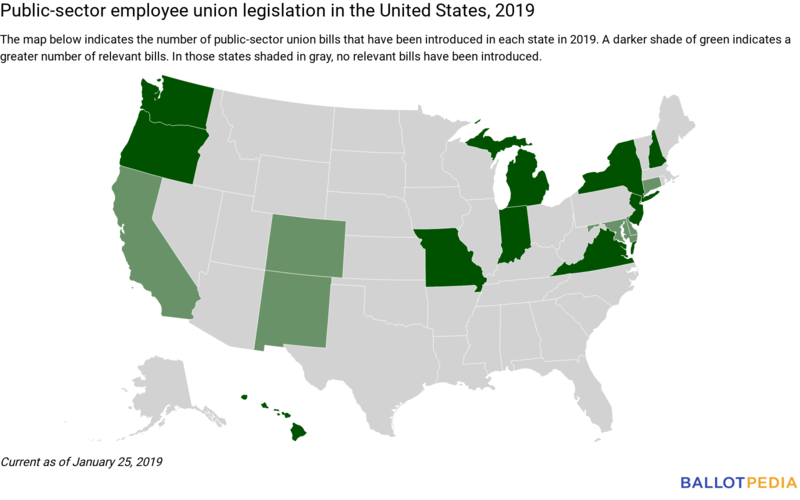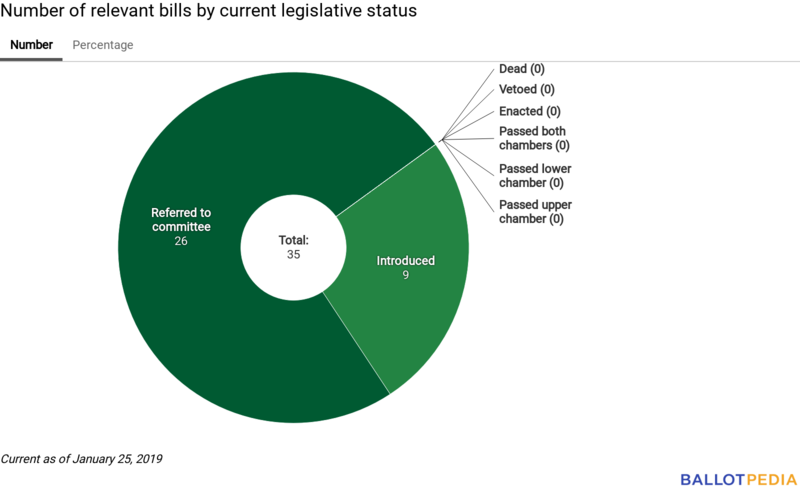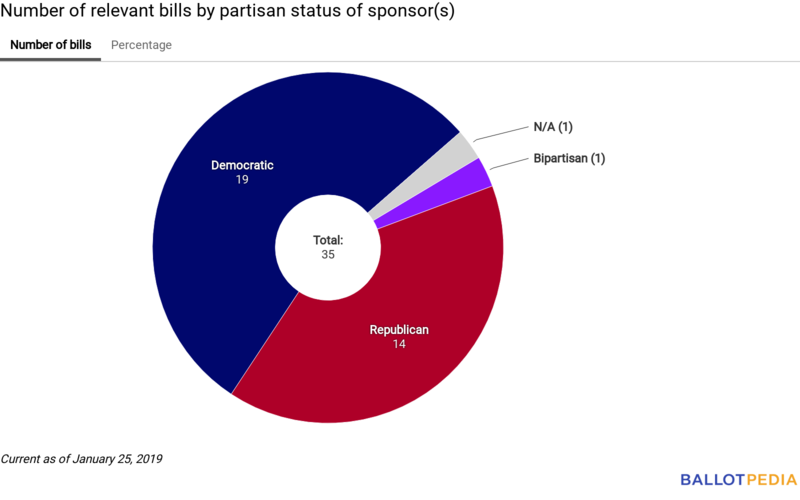Union Station: January 25, 2019
On June 27, 2018, the Supreme Court issued its 5-4 ruling in Janus v. American Federation of State, County, and Municipal Employees (Janus). The court ruled that public sector unions cannot require non-member employees to pay agency fees to cover the costs of non-political union activities. This week, we take a closer look at a New Hampshire lawsuit involving state employees claiming that union officials illegally compelled them to pay union dues as a condition of their employment.
New Hampshire lawsuit alleges union used compulsory dues as condition of employment
On Jan. 14, New Hampshire state workers filed a lawsuit against the State Employees’ Association of New Hampshire (SEA) claiming that union officials compelled them to pay union dues as a condition of their employment, a violation of their First Amendment rights. (Sources: National Right to Work Legal Defense Foundation, New Hampshire Union Leader)
- Who are the parties to the suit? State employees Patrick Doughty, an engineering technician in the Department of Transportation, and Randy Severance, an employee in the Department of Information Technology, are suing SEA-SEIU Local 1984. Doughty and Severance’s attorney is the National Right to Work Legal Defense Foundation, which also represented the plaintiff in Janus.
- What is at issue? Although Doughty and Severance were not members of the local union, New Hampshire state officials deducted union fees from their paychecks. The workers claim that union officials compelled them to pay union dues as a condition of their employment, violating their constitutional rights. They are asking the court to refund all dues and fees paid from at least the last three years.
- What are the parties to the suit saying?
- National Right to Work Foundation President Mark Mix said, “For years, New Hampshire union bosses violated the First Amendment rights of the very public employees they claimed to represent. Just as a bank robber caught red-handed would never be allowed to keep the proceeds of such criminal behavior, union officials must also return the money they’ve pilfered from the paychecks of hundreds of thousands of workers across the country in violation of the Constitution, the supreme law of the land.”
- SEA General Counsel Gary Snyder said, “The SEA has always followed the state and federal laws pertaining to the collection of fair share fees. For decades, the Supreme Court determined the collection of fair share fees was legal, and the SEA followed the Supreme Court’s interpretation. After the Supreme Court reversed its decision this past summer, the SEA immediately ceased collection of those fees in accordance with the court’s ruling. We believe the SEA will be successful in defeating this action.”
The big picture
2019 session preview: As of January 25, 2019, 37 legislatures were in session. For a complete list session start and end dates, please click here.
Number of relevant bills by state
So far this year, we have tracked 35 pieces of legislation dealing with public-sector employee union policy. On the map below, a darker shade of green indicates a greater number of relevant bills. Click here for a complete list of all the bills we're tracking.
Number of relevant bills by current legislative status
Number of relevant bills by partisan status of sponsor(s)
Recent legislative actions
Below is a complete list of legislative actions on relevant bills since the beginning of the year. Bills are listed in alphabetical order, first by state and then by bill number.
- California AB249: This bill would prohibit employers from deterring employees from becoming or remaining union members or opting out of union membership.
- Introduced Jan. 22.
- Connecticut HB05637: This bill would require state and municipal collective bargaining agreements to include statements notifying employees of their right to opt out of union membership.
- Introduced Jan. 18 and referred to the Joint Committee on Labor and Public Employees.
- Delaware SB8: This bill would establish compensation as a mandatory subject of collective bargaining efforts.
- Introduced Jan. 17 and reported out of Labor Committee.
- Hawaii SB487: This bill would require employers to reimburse unions for costs incurred during the collective bargaining process. This bill would also rescind mandatory payroll deductions for non-member employees.
- Introduced Jan. 22.
- Hawaii SB1147: This bill would allow unions to refrain from representing non-members during grievance proceedings.
- Introduced Jan. 24.
- Hawaii HB865: This bill would allow unions to refrain from representing non-members during grievance proceedings.
- Introduced Jan. 22.
- Maryland HB126: This bill would prohibit employers from requiring employees to join, refrain from joining, or remain union members as a condition of employment.
- Introduced Jan. 22 and referred to the Economic Committee.
- Missouri SB63: This bill would prohibit practices requiring individuals to become, or refrain from becoming, union members as a condition of employment.
- Introduced Jan. 9 and referred to the Government Reform Committee.
- New Hampshire SB18: This bill would allow public employees to authorize voluntary wage deductions for insurance or employee benefits offered in conjunction with the employees' membership in a recognized union.
- Introduced Jan. 14 and reported out of the Commerce Committee.
- New Hampshire SB19: This bill would prohibit disclosure of information regarding a public employee's home address, email address, or phone number; an exemption would be made for unions.
- Introduced Jan. 14 and referred to the Commerce Committee.
- New Hampshire SB148: This bill would require public employers to notify hirees of their right to join or refrain from joining; the notification would also include the estimated annual cost of joining a union.
- Introduced Jan. 3 and referred to the Commerce Committee.
- New Hampshire HB363: This bill would establish the state Legislature as a public employer under the state's public-employer labor relations laws.
- Introduced Jan. 7. Hearing scheduled for Jan. 30.
- New Mexico HB85: This bill would authorize employers and labor unions to enter into agreements requiring employees to become union members as a condition of employment.
- Introduced Jan. 15 and referred to the Labor, Veterans', and Military Affairs Committee.
- Oregon HB2276: This bill prohibit public employers and labor unions from entering into agreements authorizing the deduction of in-lieu-of-dues payments from public employee paychecks.
- Introduced Jan. 14 and referred to the Business and Labor Committee.
- Oregon HB2567: This bill would require the state Employment Relations Board to conduct a study "relating to public employers subject to public employee collective bargaining act" and submit that study to the legislature by Sept. 15, 2021.
- Introduced Jan. 14 and referred to the Business and Labor Committee.
- Oregon HB2580: This bill would mandate that class size and caseload limits be subjects of collective bargaining agreements entered into by school districts.
- Introduced Jan. 14 and referred to the Education Committee.
- Oregon HB2643: This bill would require public employers to notify hirees of their right to join or refrain from joining; the notification would also include the estimated annual cost of joining a union.
- Introduced Jan. 14 and referred to the Business and Labor Committee.
- Oregon HB2726: This bill would allow non-members to make voluntary contributions to labor unions via payroll deduction.
- Introduced Jan. 22 and referred to the Speaker's desk.
- Washington HB1333: This bill would alter the definition of a public employee under the state's public employee's collective bargaining law.
- Introduced Jan. 18. A hearing was held Jan. 24.
See also
| |||||||||||||||||||||||





